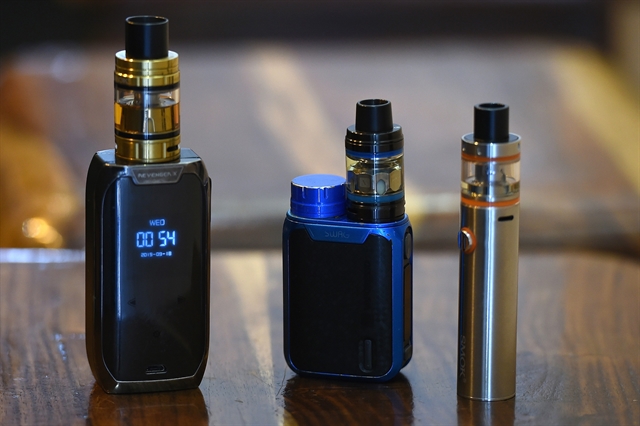 Society
Society

E-cigarettes and heated tobacco products (HTPs) were not safe for children, adolescents or young people, and these new products targeting young people had in fact created a new generation of addicts, experts warned.

|
| Electronic cigarette devices. Photo for illustration. — AFP/VNA Photo |
HÀ NỘI — E-cigarettes and heated tobacco products (HTPs) were not safe for children, adolescents or young people, and these new products targeting young people had in fact created a new generation of addicts, experts warned.
According to Nguyễn Huy Quang, director of the Legal Affairs Department under the Ministry of Health, multiple studies had proven that electronic cigarettes and HTPs were as harmful as traditional cigarettes.
In addition, e-cigarettes and HTPs were also being used to smoke illegal drugs and posed a fire hazard, said Quang.
A Ministry of Health report said that in 2015, only 0.2 per cent of the population used e-cigarettes. This year that figure has jumped to 2.6 per cent of people aged from 13 to 17.
In Hà Nội and HCM City, that number is 7 per cent.
Young people – the target
Because of the huge profits, many manufacturers and distributors of e-cigarettes and HTPs used social networks as their main communications channel to target young people, experts said at a recent meeting held by the ministry to gather recommendations to control e-cigarettes and HTPs.
The meeting heard that a series of "tricks" were being used such as hiring key opinion leaders (KOLs) for advertising and organising art events for marketing, while age checks were lacking.
In the context of social distancing caused by the COVID-19 pandemic, social media advertising has had more opportunities to develop and reach potential customers.
To attract smokers, tobacco companies had advertised their e-cigarettes by saying they helped people quit traditional cigarettes, and did not have the same harmful effects, said Nguyễn Hạnh Nguyên, a representative of Canada’s HealthBridge in Việt Nam.
There were also various sale tactics being deployed on social networks aimed at young customers, such as cheap prices, diverse, trendy and eye-catching designs and various flavours to draw in youngsters, especially teenagers.
A survey on the use of new types of cigarettes conducted in July by HealthBridge showed that young people were heavily influenced by marketing campaigns.
A 22-year-old man said he had watched an advert about new products and flavours that made him curious, so he'd decided to buy some to try out, and now he was hooked.
Meanwhile, a 21-year-old girl said she preferred smoking new types of cigarettes than traditional cigarettes, and their designs were vivid and trendy.
Luring in young people with these advertising strategies had slowed the number of people giving up through dual use of traditional cigarettes and electronic cigarettes or HTPs, or all three of them together, said the experts.
Unlike nicotine- and non-nicotine containing drugs that had been tested to help quit smoking, the World Health Organization (WHO) did not endorse e-cigarettes.
Nguyễn Tuấn Lâm, an expert from the WHO in Việt Nam, said the nicotine contained in traditional cigarettes as well as e-cigarettes and HTPs badly affected the health of smokers and passive smokers.
The substance also causes abnormal complications in babies such as sudden death, hearing loss and limited brain development.
In adolescents, nicotine caused loss of control, poor concentration and impaired memory.
Some types of tobacco were also mixed with chemicals which adversely affected the physical and mental health of smokers, Lâm said.
Therefore, it was necessary to minimise the exposure of young people to them, he said.
Strict sanctions needed
Some e-cigarettes and HTPs had already been banned in certain countries, Quang said.
“To catch up with the trend and avoid the consequences faced by some countries, Việt Nam should ban e-cigarettes and HTPs,” Quang said.
The Ministry of Health had asked the Government to issue strict measures to ban the import, manufacturing and use of e-cigarettes and HTPs in Việt Nam, he said.
“People have the right to live in a clean environment not affected by tobacco smoke," he said.
Trần Thị Trang, vice director of the Legal Affairs Department, said that currently, the size of the market for new types of tobacco products was small (about 2.6 per cent), and none were domestically produced.
The most effective way of dealing with the issue would be to prevent the use of these products immediately to avoid the risk of developing new products in parallel with traditional cigarettes, said Trang.
According to the vice director, the Ministry of Health had been reviewing the advertising and sale of e-cigarettes and HTPs on social networks.
Regarding plans to review and detect violations, the Ministry of Health regularly sends out inspection teams and is developing measures to prevent the harm caused by tobacco.
The Ministry of Health had been co-operating with the Ministry of Information and Communication to use technology to manage online stores and control advertisements for e-cigarettes and HTPs on social networks, Trang said.
Authorities could ask big social networks such as Facebook and Google to block illegal advertisements, Trang said.
The Ministry of Health has also co-operated with the Ministry of Culture, Sport and Tourism, Ministry of Industry and Commerce, Ministry of Finance, General Department of Việt Nam Customs and people’s committees to enhance management and uncover any violations.
At present, advertising for tobacco products is currently handled according to regulations with administrative violations for commercial activities, production and trade of counterfeit and banned goods to protect the interests of consumers, Trang said.
Acts relating to advertising e-cigarettes and HTPs online would be fined up to VNĐ400 million (US$17,200), she said.
The Ministry of Health had been collecting opinions from relevant ministries and sectors to compile a plan to prevent e-cigarettes and HTPs that would be submitted to the Government this year, she added. — VNS




